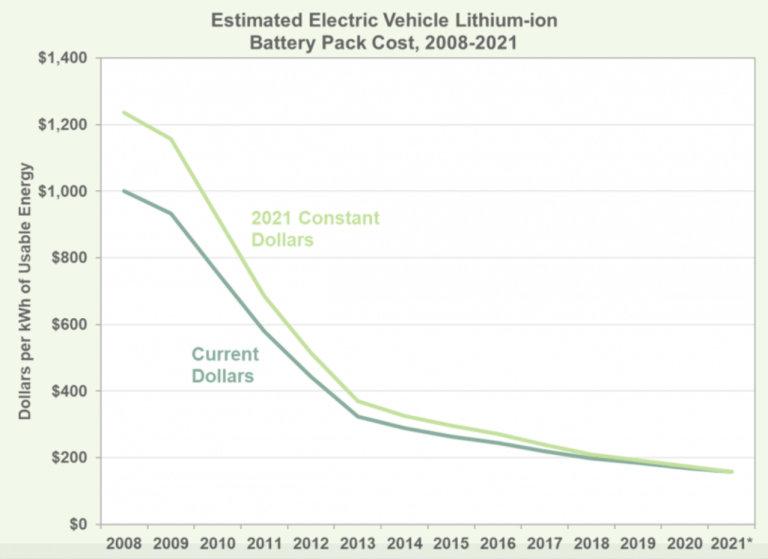The Declining Price of EV Battery Packs
Good news for the price of electric vehicle (EV) batteries! New findings by the Department of Energy’s (DOE) Vehicle Technologies Office estimates the cost of an electric lithium-ion battery pack declined 87% between 2008 and 2021 (using 2021 constant dollars). Lithium-ion battery packs are the power source for most EVs. The 2021 estimated price of a lithium-ion battery pack is $157/kWh on a usable energy basis for production at scale (100,000 units per year). In comparison, the price was $1,237/kWh on a usable energy basis in 2008! This reduction in battery pack price approaches the $100 threshold at which the cost should match a car with an internal combustion engine. The cost decline is due to improvements in battery technology and chemistry and an increase in manufacturing volume.

While these gains over the past decade are impressive, price reductions are expected to slow as supply scrambles to meet the growing demand. Temporary shortages could affect the short-term price for the critical battery ingredient — lithium as companies scale up production. However, lithium is abundant, with an estimated 21 million tons in reserve worldwide. Further price impacts could occur with supply issues with other components such as cobalt and nickel.
Despite these potential setbacks, the price of lithium-ion battery packs is expected to plummet to $92 kWh by 2024, according to Bloomberg NEF. Technological gains will also aid in lowering the cost. For example, laboratories are experimenting with low-cobalt and or cobalt-free batteries, and companies across the globe have plans to build new electric vehicle battery factories.
It is important to note that federal regulations dictate an EV’s battery pack be covered for at least 8‑years or 100,000 miles. Be sure to check with your vehicle manufacturer as warranties can differ. Some manufacturers offer replacements if the battery life drops below a certain percentage, like 75% for the Nissan Leaf. Tesla provides an extended warranty of 8‑years or 150,000 miles for its new Model S and X and a 70% battery life replacement threshold. However, EV batteries can last approximately 10 years or longer under normal driving conditions before needing replacement, longer than most people keep a new car. This means the majority of drivers will not have to pay for a replacement battery out of pocket.
Sources
https://www.nature.com/articles/d41586-021–02222‑1
https://afdc.energy.gov/vehicles/electric_batteries.html
https://pubs.usgs.gov/periodicals/mcs2021/mcs2021-lithium.pdf
https://www.tesla.com/support/vehicle-warranty
https://www.truecar.com/blog/how-long-do-electric-car-batteries-last/




